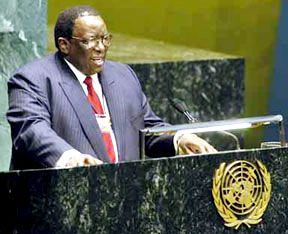Africa deserve membership of the UN Security Council (GhanaWeb, 0415-2005)

UNITED NATIONS (FinalCall.com) – African diplomats at the United Nations say they are not backing down on their demands that the Security Council reform package, which must be passed by the General Assembly, must have two permanent seats for Africa with veto power and three non-permanent seats.
“Africa is together on this and we speak with one voice concerning Security Council reform,” insists Sierra Leone’s Deputy Ambassador Allieu Kanu. Africa has the numbers–53 out of the 191 nations–and it is time for Africa to take its rightful place on the world stage, Mr. Kanu stressed.
The General Assembly began a two-day plenary, Apr. 13-14, on how to proceed with Secretary-General Kofi Annan’s reform package, which focuses on development, security and human rights. Observers say that, if the proposals are adopted, the world body would be radically altered. Mr. Annan continues to insist that the General Assembly have a consensus ready on the reform package when world leaders convene their September summit in New York.

According to an Apr. 13 story by the Inter Press Service (IPS), both the United States and China have been “critical” of Mr. Annan’s push to have his proposals approved by September.
“The urgent need for transformation of the UN had already been clear from its failures to prevent or stop genocides in Cambodia, Rwanda and Bosnia, and the UN’s culpability in the deaths of a half-million children due to UN-imposed sanctions on Iraq,” wrote Edward Horgan on Apr. 14 in an Irish Times op-ed piece. Mr. Horgan is a Government of Ireland scholar, completing a Ph.D. research program on UN reform at the University of Limerick.
Mr. Horgan’s argument was simple: The UN had been “crippled” since its founding in 1945, because its Charter gave five nations a “stranglehold” over all security actions undertaken by the UN. He said the idealism contained in the preamble of the Charter is “undone by the realism of the veto system.” He also said that there could be no “real” reform of the UN without first reforming the veto system.
He pointed out that Britain, France and the U.S. account for six percent of the world’s population, and have the majority of the UN veto powers, while India, with 18 percent, would probably be offered a “second-class permanent membership” with no veto power. He added that Indonesia, the fourth most populous nation, has not figured in any proposals. “Obviously, those who already have a veto are not going to play ball and allow a diminution of their powers,” Mr. Horgan added.
But, according to IPS the “P-5” (Russia, France, the U.S., China and Britain) are not the only nations opposing an increase in permanent membership. According to IPS, there is a group of 40 nations, headed by Italy, South Korea, Pakistan, Argentina and Mexico, that want to see only an increase in the number of non-permanent members. The IPS story also said that the group wants to block Japan, Germany, India and Brazil from permanent membership. The four nations have been mentioned often as the leading candidates for permanent seats.
Observers say that many of the wounds from the Second World War have not healed. China and South Korea are critical of Japan’s wartime past. Italy opposes Germany, and Argentina and Mexico claim that they best represent Latin America. Pakistan has said that they are simply against any new permanent members, but observers say Pakistan privately cannot see rival India with a permanent seat.
“It is unfortunate that these feelings about WWII are surfacing at this time,” South African Ambassador Dumisani Kumalo told The Final Call. He said that the view in South Africa was forward-looking. Observers say that the leading candidates for the African seats are South Africa, Nigeria and Egypt.
Ambassador Kumalo reiterated the South African rejection of “Model B” of the Annan proposal, which provides no new permanent seats. “Model A” provides for six new permanent seats, none with veto power.
One high-level delegate from Benin, which now serves as one of the 10 non-permanent members, speaking anonymously, said that most of the discussions in the Security Council are concerning Africa.
“But we don’t have a real voice without the veto. It’s always others deciding what is good for Africa,” the representative from Benin said.












